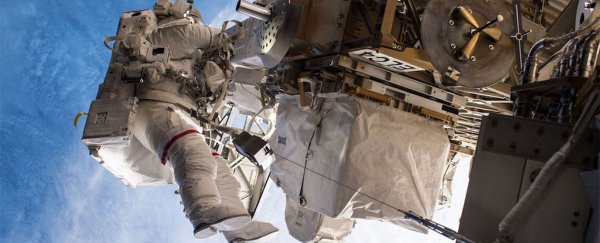Seeing our planet from space is a rare treat – fewer than 540 people have ever left the Earth.
Seven astronauts who've blasted off from our planet with NASA came together this week for the premiere of the National Geographic series One Strange Rock.
The show, produced by Darren Aronofsky, takes an up-close look of life on Earth from a range of perspectives, juxtaposing macro views of the planet from space with micro shots of some of the tiniest oxygen-producing organisms, which are four times thinner than a human hair.
The program aims to show off "the beautiful clockwork" of the Earth, Aronofsky said, adding that "it's much more complicated than anything a human could conceive of."
The astronauts featured in the series said that leaving the Earth changed their view of our world in remarkable ways.
Some obtained a different kind of understanding of the science they were taught as kids, while others gained an appreciation for the fact that we don't have to recycle our urine to make coffee here.
The seven astronauts sat down to chat with us about what going to space is really like.
Astronauts have a wide variety of reactions to living in space. Some said it made them feel small and insignificant, while others said it made them feel like a god.
But one common theme emerged: Being in space gives astronauts a chance to connect to their home in a whole new way.
 Mae Jemison (NASA)
Mae Jemison (NASA)
"It got rid of that feeling of insignificance," Mae Jemison, who went to space in 1992, said of the experience.
"I was as much a part of this universe as any speck of stardust. I had as much right to be here."
 Jerry Linenger (NASA)
Jerry Linenger (NASA)
Jerry Linenger said that when he was looking down at the Earth, he sometimes felt like a cosmic creator. "I am like God!" he said.
But being in space also made him aware of his impermanence in the universe.
"I'm just a speck in time," Linenger said. "How life evolved is fascinating … It all came together, and here we are."
 Mike Massimino (NASA)
Mike Massimino (NASA)
Mike Massimino marveled at the supreme curvature of the Earth.
He thinks there's a good chance there's life elsewhere but said he "wouldn't be surprised if there's nothing quite as nice as this place."
"I think we're pretty significant," Massimino said. "And maybe someone else has a planet somewhere else, but I really think we're gonna win the home tour."
 Chris Hadfield (NASA)
Chris Hadfield (NASA)
The Twitter-famous Canadian astronaut Chris Hadfield said that after circling the world on the International Space Station about 2,650 times, he started to consider his home more expansively.
At first, Hadfield said, he fixated on the familiar parts of the world.
"Your body just picks out the stuff it recognises," he said.
But that habit changed after a few months of circling the Earth roughly 16 times a day. "What in all of my previous life had been a foreign 'them' part of the world was now just inevitably 'us,'" he said.
"The difference between 'us' and 'them' went away."
 Jeff Hoffman (NASA)
Jeff Hoffman (NASA)
Jeff Hoffman went to space five times between April 1985 and March 1996. During that time, he saw the slashing of the Amazon rainforest.
"That really got my attention," he said.
"I'll hear some of my astronaut colleagues talk about how from space you can't see boundaries, but it's not true - you do see them," Hoffman said, adding that you see "different agricultural practices and human behaviour on different sides of borders."
 Nicole Stott (NASA)
Nicole Stott (NASA)
Nicole Stott said that at first, looking out the window of the ISS was overwhelming. "You're just like, 'Holy shite, what am I seeing out here?'" she said.
"My first view out the window, I didn't even know where it was that I was looking," she said.
Stott said that once when she was outside the space station, hanging onto it with just one hand, she understood why her mum was freaked out about her trip to space.
"I'm waving, you know, saying hi, and you see this little bit of the station, but all the rest of it is just black," Stott said.
Just one hand and a tether cord were strapping her to humanity, 250 miles from Earth's surface.
 Peggy Whitson (NASA)
Peggy Whitson (NASA)
But perhaps no one better understands what it's like to be in space than Peggy Whitson, who has spent 665 days there - more time than any other American.
Whitson has been up there so often that she has started to see the Earth like another big space ship - a really impressive one.
"We're up there trying to re-create everything that's happening here on Earth, and that is really hard," she said.
Whitson said that on our planet, we have the capability to be a 100 percent independent, robust recycling system.
The space station, by comparison, operates at about 85 percent recycling capability by doing things like turning urine into water for coffee.
"If we're going to explore in deep space, we're going to have to take our atmosphere with us, our climate with us — we have to take all those things," Whitson said.
Humans are supported completely by this planet – a simple truth she says she appreciates more after her time in space.
"This is a very complex, intertwined system that we have here on Spaceship Earth," she said.
You can watch the full One Strange Rock series, which is narrated by Will Smith and includes appearances by all these astronauts, starting March 26 on the National Geographic channel.
This article was originally published by Business Insider.
More from Business Insider:
